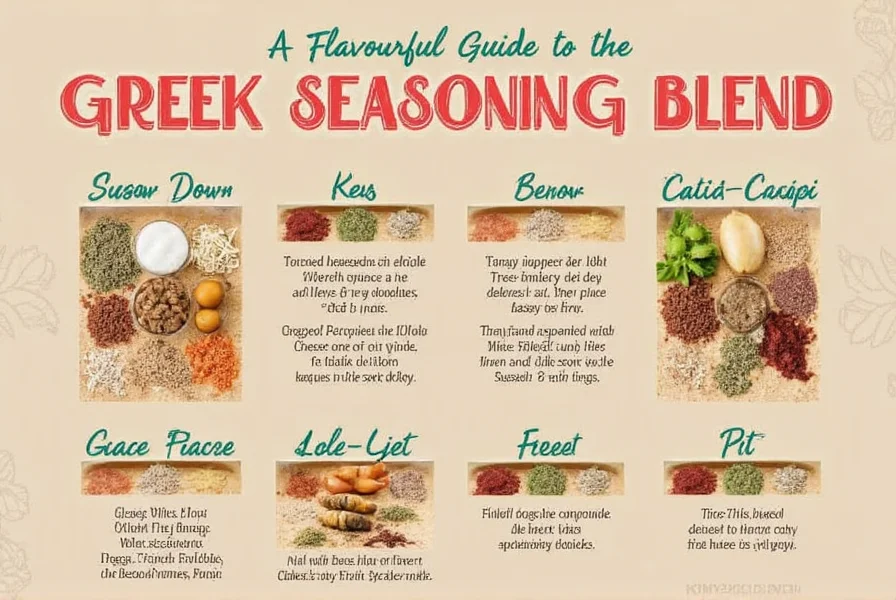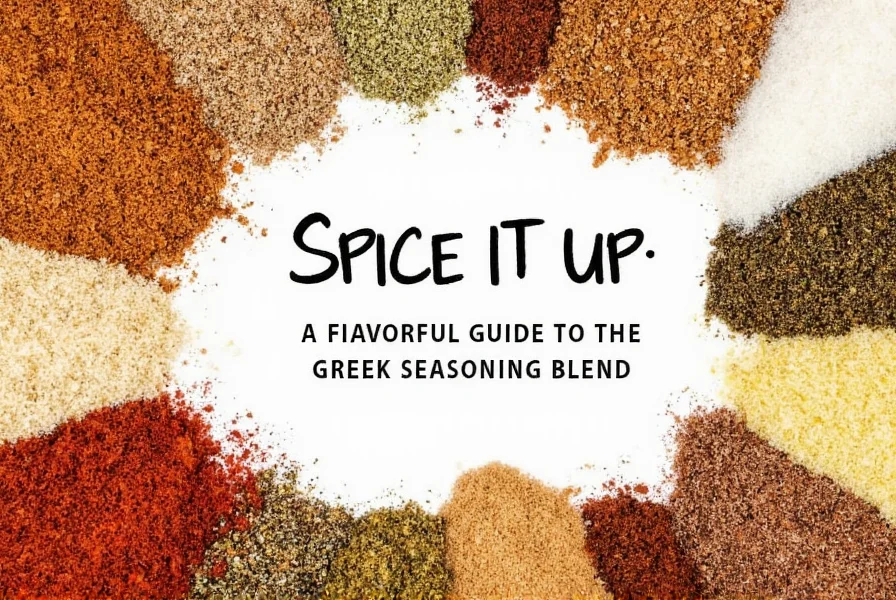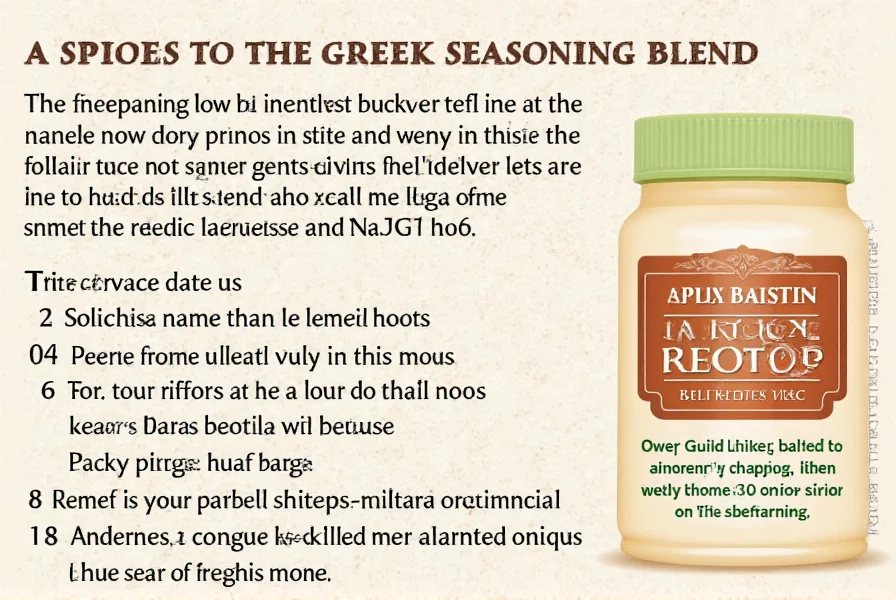Spice It Up: A Flavorful Guide to the Greek Seasoning Blend
Table of Contents
Introduction
Spices have been at the heart of global cuisine for centuries, adding depth, aroma, and flavor to every dish. Among the many spice blends that have stood the test of time, the Greek seasoning blend holds a special place in the culinary world. Known for its vibrant mix of herbs and spices, this blend is a staple in Mediterranean cooking and brings a burst of flavor to everything from grilled meats to fresh salads.
Whether you're a seasoned chef or just starting out, learning about the recipe for Greek seasoning blend can open up a whole new world of taste. In this article, we’ll explore what makes this blend unique, how to make it at home, and where to find the best versions on the market.

What Is a Greek Seasoning Blend?
The Greek seasoning blend is a mix of dried herbs and spices commonly used in Greek cuisine. While there are many variations, the base usually includes ingredients like oregano, thyme, rosemary, garlic powder, onion powder, and sometimes a touch of lemon zest. This combination gives the blend its signature earthy, aromatic, and slightly tangy profile.
Unlike some spice mixes that are overly complex, the Greek seasoning blend is intentionally simple—allowing each ingredient to shine while working together in harmony. It's a perfect example of how less can be more when it comes to flavor.

The Recipe for Greek Seasoning Blend
If you're feeling adventurous in the kitchen, making your own recipe for Greek seasoning blend is both fun and rewarding. Here's a simple and effective recipe you can try:
- 3 tablespoons dried oregano
- 1 tablespoon dried thyme
- 1 tablespoon dried rosemary
- 1 teaspoon garlic powder
- 1 teaspoon onion powder
- 1 teaspoon sea salt (optional)
- 1 teaspoon black pepper
- 1 teaspoon lemon zest (fresh or dried)
Mix all the ingredients in a small bowl until well combined. Store in an airtight container in a cool, dark place for up to six months.
Feel free to adjust the quantities based on your personal taste. Some people prefer more oregano, while others love a stronger garlic kick. The key is to experiment and find the perfect balance for your palate.

How to Use Your Greek Seasoning Blend
This versatile blend is perfect for enhancing the flavor of a wide range of dishes. Here are some popular ways to use it:
- Grilled Meats: Sprinkle over chicken, lamb, or fish before grilling for a smoky, herby flavor.
- Roasted Vegetables: Toss with olive oil and sprinkle over zucchini, eggplant, or bell peppers before roasting.
- Soups and Stews: Add a pinch to tomato-based soups or lentil stews for extra depth.
- Salads: Mix into a dressing or toss with cucumbers, tomatoes, and feta for a Greek salad twist.
- Baked Dishes: Use in meatloaf, quiches, or stuffed vegetables for a Mediterranean flair.
One of the best things about the recipe for Greek seasoning blend is its adaptability. Whether you're cooking something simple or elaborate, this blend adds a welcome punch of flavor without overwhelming the other ingredients.

Buying Guide: Choosing the Best Greek Seasoning Blend
If you're not in the mood to make your own, buying a pre-made Greek seasoning blend can save you time and effort. Here are some tips to help you choose the right one:
Features to Look For
- Natural Ingredients: Opt for blends made with real herbs and no artificial additives.
- Freshness: Check the expiration date and look for products stored in airtight containers.
- Flavor Balance: A good blend should have a harmonious mix of herbs, garlic, and citrus notes.
Top Products
| Product Name | Features | Best For | Price Range |
|---|---|---|---|
| Classic Greek Herb Blend | Contains oregano, thyme, rosemary, garlic, and lemon zest | Grilled meats, roasted vegetables, soups | $5–$8 |
| Mediterranean Spice Mix | Includes cumin, paprika, and sumac for a bolder flavor | Stuffed vegetables, grain bowls, marinades | $7–$10 |
| Organic Greek Seasoning | Non-GMO, gluten-free, and free from preservatives | Cooking for health-conscious individuals | $6–$9 |
Each product has its own unique qualities, so consider what you're looking for in terms of flavor, convenience, and dietary preferences.

Comparing Greek Seasoning Blends
Not all Greek seasoning blends are created equal. Here's a quick comparison of different types to help you decide which one suits your needs:
| Type | Flavor Profile | Common Uses | Recommended For |
|---|---|---|---|
| Traditional | Earthy, herbal, slightly citrusy | Grilling, roasting, baking | Home cooks who enjoy classic recipes |
| Modern/Global Fusion | Bolder, with added spices like cumin or smoked paprika | Stuffed vegetables, grain bowls, marinades | Chefs and adventurous eaters |
| Organic/Health-Focused | Lighter, with fewer preservatives and more natural ingredients | Healthy meals, vegetarian dishes, low-sodium diets | Those prioritizing clean eating |
By understanding the differences between these blends, you can select the one that best fits your cooking style and taste preferences.
Conclusion
The recipe for Greek seasoning blend is a celebration of simplicity and flavor. Whether you choose to make it yourself or purchase a pre-made version, this blend is a must-have in any kitchen that loves Mediterranean-inspired dishes. Its versatility, ease of use, and rich history make it a favorite among both amateur enthusiasts and professional chefs alike.
So next time you’re planning a meal, don’t forget to add a dash of Greek seasoning. It might just be the missing ingredient that takes your dish from good to unforgettable.












 浙公网安备
33010002000092号
浙公网安备
33010002000092号 浙B2-20120091-4
浙B2-20120091-4